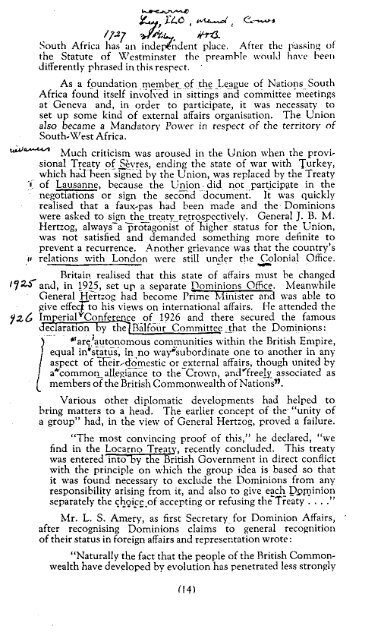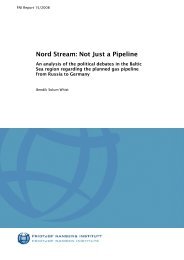SAIIA SOUTH AFRICAN DIPLOMATS ABROAD.pdf
SAIIA SOUTH AFRICAN DIPLOMATS ABROAD.pdf
SAIIA SOUTH AFRICAN DIPLOMATS ABROAD.pdf
Create successful ePaper yourself
Turn your PDF publications into a flip-book with our unique Google optimized e-Paper software.
tco ,<br />
South Africa has an independent place, After the passing of<br />
the Statute of Westminster the preamble would have been<br />
differently phrased in this respect.<br />
As a foundation member of the League of Nations South<br />
Africa found itself involved in sittings and committee meetings<br />
at Geneva and, in order to participate, it was necessary to<br />
set up some kind of external affairs organisation. The Union<br />
also became a Mandatory Power in respect of the territory of<br />
South-West Africa.<br />
s ^ / " e ' c ^ Much criticism was aroused in the Union when the provisional<br />
Treaty of .Sevres, ending the state of war with T.urkey,<br />
which had heen signed by the Union, was replaced by the Treaty<br />
' °f Lausanne, because the Union-did. not participate in the<br />
negotiations or sign the second document. It was quickly<br />
realised that a faux-pas had been made and the Dominions<br />
were asked to sign thejtreatyretrospcctiyely. General J. B. M.<br />
Hertzog, always~a "protagonist of higher status for the Union,<br />
was not satisfied and demanded something more definite to<br />
prevent a recurrence. Another grievance was that the country's<br />
« relations with London were still under the Colonial Office.<br />
Britain realised that this state of affairs must be changed<br />
( in 1925, set up a separate Dominions Office. Meanwhile<br />
General Hertzog had become Prime Minister and was able to<br />
give effecjtto his views on international affairs. He attended the<br />
Imperial Conference of 1926 and there secured the famous<br />
declaration by theJBalfour Committee that the Dominions:<br />
*" are/autonomous communities within the British Empire,<br />
equal in'status, in no way'subordinate one to another in any<br />
aspect of Their^-domestic or external affairs, though united by<br />
a*common_ allegiance to the Crown, andTreeJ!y associated as<br />
members of the British Commonwealth of Nations",<br />
Various other diplomatic developments had helped to<br />
bring matters to a head. The earlier concept of the "unity of<br />
a group" had, in the view of General Hertzog, proved a failure.<br />
"The most convincing proof of this," he declared, "we<br />
find in the Locarno Treaty, recently concluded. This treaty<br />
was entered into" by the British Government in direct conflict<br />
with the principle on which the group idea is based so that<br />
it was found necessary to exclude the Dominions from any<br />
responsibility arising from it, and also to give each Dominion<br />
separately the choice.of accepting or refusing the Treaty . . . ."<br />
Mr. L. S. Amery, as first Secretary, for Dominion Affairs,<br />
after recognising Dominions claims to general recognition<br />
of their status in foreign affairs and representation wrote:<br />
"Naturally the fact that the people of the British Commonwealth<br />
have developed by evolution has penetrated less strongly<br />
(H)













